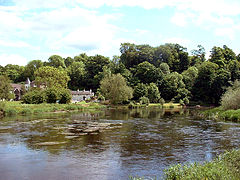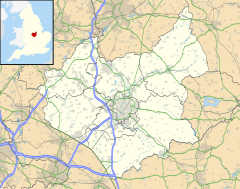King's Mill, Castle Donington
| King's Mill | |
|---|---|
 |
|
| King's Mill shown within Leicestershire | |
| Population | small |
| OS grid reference | SK446272 |
| District | |
| Shire county | |
| Region | |
| Country | England |
| Sovereign state | United Kingdom |
| Post town | Derby |
| Postcode district | DE74 |
| Dialling code | 01332 |
| Police | Leicestershire |
| Fire | Leicestershire |
| Ambulance | East Midlands |
| EU Parliament | East Midlands |
King's Mill is the traditional crossing point of the River Trent between Castle Donington (where the population is included) in Leicestershire and Weston-on-Trent in Derbyshire. The Mill was the farthest point that traffic from the River Humber could progress. A lock was installed here to make the river navigable but the business eventually collapsed due to competition with the Trent and Mersey Canal. The mill was used for grinding flints for the pottery industry, locally mined plaster, and dyestuffs when it was owned by Samuel Lloyd of the Birmingham banking company.
Activity in this area is known to date from 3,500 bce as a log loat was discovered in nearby Shardlow which contained stones quarried at King's Mill. The stone is presumed to have been destined for strengthening a causeway across the River Trent. This boat is now preserved in Derby Museum.
Control of this river crossing is first mentioned in a charter agreed by Æþelræd Unræd (King Ethelred the Unready) in 1009 which recognised the position and boundaries of Weston. The charter shows that Weston controlled the crossings of the Trent at, Weston Cliff, Kings Mill and Wilne. These crossings controlled one of the main routes for travellers moving up or down England and was a boundary within Mercia. This land was then given to Morkar, the King's chief minister, and he was unusually given rights that were normally reserved for the King alone. He was given the responsibility for justice and exemption from the trinoda, he alone could decide a fate of life or death without the need of the authority of the King or his sheriff.
In February 1309 a dispute was settled between Henry de Lacy of Castle Donington and the Abbey of Chester over the fishing rights here. Unusually the dispute was settled not with either side having rights up to the middle of the river, but with the manor of Castle Donington owning their land and the river up to the northern bank. The boundary of Derbyshire and Leicestershire still take this line.
...
Wikipedia

